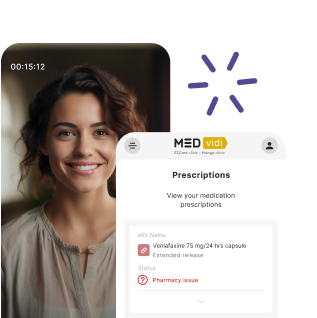Lexapro is one of the commonly prescribed medications for depression and anxiety. Usually, the basic instructions from healthcare providers include recommendations on the dosage and the schedule for taking medication, but it’s essential to discuss other aspects of treatment too. For example, how to deal with potential side effects and whether it’s safe to drink while taking Lexapro.
Depression and anxiety disorders require careful treatment, so it may be necessary to make certain lifestyle adjustments. Read on to know how Lexapro interacts with alcohol, what possible dangers are, and how alcohol can affect mental health overall.
Personalized ongoing treatment

About Lexapro
Lexapro belongs to a class of selective serotonin reuptake inhibitors (SSRI) and is designed to treat depression and anxiety. The main element of its formula is escitalopram, which inhibits the reuptake of serotonin by neurons to prevent its depletion. It works by increasing the amount of serotonin available in the brain and correcting neurochemical imbalances.
Lexapro was approved by the U.S. Food and Drug Administration (FDA) on October 20, 2002, for sale in the United States. The medication is FDA-approved to treat the following conditions:
It is also sometimes used off-label to treat the following conditions:
- Social anxiety disorder
- Panic disorder with or without agoraphobia
- Post-traumatic stress disorder (PTSD)
Can You Drink Alcohol While Taking Lexapro?
Drinking alcohol while taking
Though this medication has proven very useful for many individuals with depression, PTSD, and panic disorder, it’s important to follow the rules to get the necessary effects. Mixing Lexapro and alcohol can cause side effects like drowsiness or extreme fatigue and reduce the efficacy of treatment.
Alcohol can impair judgment and affect mood, so drinking on Lexapro brings the possibility of emotional changes. It’s also good to know that mixing Lexapro and alcohol may prevent your body from processing serotonin correctly, leading to additional side effects like vomiting or diarrhea.
What Happens If You Drink While Taking Lexapro?
If you drink alcohol while taking Lexapro, it can cause post-acute withdrawal syndrome (
Lexapro and Alcohol Interaction
Both alcohol and Lexapro (escitalopram) can affect the central nervous system. So, when they are used together, it can increase the risk of certain side effects and make the treatment of a mental health disorder less effective.
Alcohol can enhance the sedative effects of Lexapro, leading to dizziness, drowsiness, and impaired coordination. It can also potentially worsen symptoms of depression and anxiety, which Lexapro is commonly prescribed to treat.
Lexapro and Alcohol: Side Effects
Combining Lexapro with alcohol can result in various side effects, such as:
- Increased sleepiness and dizziness. Both Lexapro and alcohol have the potential to cause dizziness or drowsiness. When combined, these symptoms can become more pronounced, making it risky to drive or operate machinery.
- Impaired coordination. Drinking alcohol and taking Lexapro together can make it harder to balance and coordinate, which raises the possibility of mishaps and falls.
- Worsened anxiety or depression. Because alcohol is a
depressant[4] , it can negate the benefits of using Lexapro to treat mental health disorders. Rather than relieving symptoms, it can make them worse. - Mood swings and emotional instability. The interactions of Lexapro and alcohol can cause irritation, mood swings, and emotional instability.
- Liver problems. When used along with Lexapro, alcohol use may raise the risk of liver issues because of putting additional strain on the liver.
- Risk of alcohol dependency. Because Lexapro might alter how the body processes alcohol, some people may be more vulnerable to developing alcohol dependence or alcohol use disorder.
Can Lexapro and Alcohol Cause Blackouts?
In some cases, the adverse effects of taking Lexapro with alcohol are more serious, including the risk of
Effects of Alcohol on Mental Health Disorders
Alcohol consumption can have a
For example, alcohol is a depressant, and although it may offer short-term relief from depressive symptoms, it might make depression worse over time. The excessive consumption of alcohol can upset the chemical balance of the brain, leading to an increase in feelings of depression and hopelessness.
Similar to depression, anxiety symptoms can initially seem to be alleviated by alcohol. However, once the initial intoxication wears off, it frequently raises anxiety levels, which may eventually result in more frequent and severe anxiety.
Other than anxiety and depression, the following are some typical ways that alcohol can either exacerbate or affect all mental health conditions:
- Suicidal ideation. Alcohol use disorder raises the possibility of suicidal thoughts and actions, which is concerning for those with mental health issues.
- Cognitive impairment. Chronic alcohol addiction can impair memory, concentration, and decision-making. This can be especially troublesome for people who already struggle with cognitive issues as a result of mental health illnesses.
- Interference with treatment. Alcohol consumption may reduce the efficacy of the antidepressant medication or some other medicines, making symptom management more challenging.
Safety Considerations
Taking Alcohol and Lexapro together can cause adverse effects, so use the following general recommendations to make your treatment less stressful:
- Avoid skipping your Lexapro dose. Skipping a Lexapro medication to have a drink is not advised, it’s advised to avoid drinking. To effectively manage a mental health disorder, you must take your prescription consistently. Your treatment may be disrupted if you miss a dosage.
- Lexapro after alcohol. Taking Lexapro after alcohol is generally safe, but to reduce the possibility of interactions, it’s advised to wait for some time before doing so.
- Hydration. Drinking alcohol can cause dehydration, which can exacerbate the negative effects of drinking and taking Lexapro.
- Keep an eye on side effects. Pay close attention to any unexpected side effects or deterioration of your mental health. Inform your healthcare provider immediately if you have any adverse side effects or symptoms.
For more precise advice, speak with your healthcare practitioner.
Summing Up
Mixing Lexapro and alcohol is not recommended since their interactions can cause agitation, insomnia, irritability, hangover, increased anxiety, tension, restlessness, paresthesias (numbness or tingling), tremors (shaking), and sweating (diaphoresis). This also includes the worsening of depressive symptoms.
Remember to always check with your doctor before making any changes to your prescription to avoid adverse effects on your mental health.













